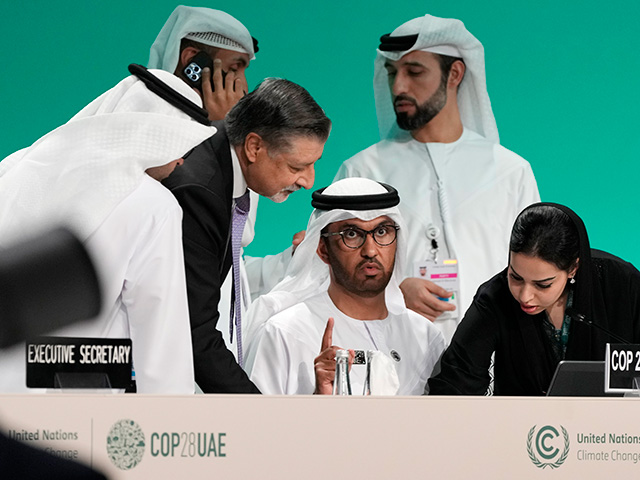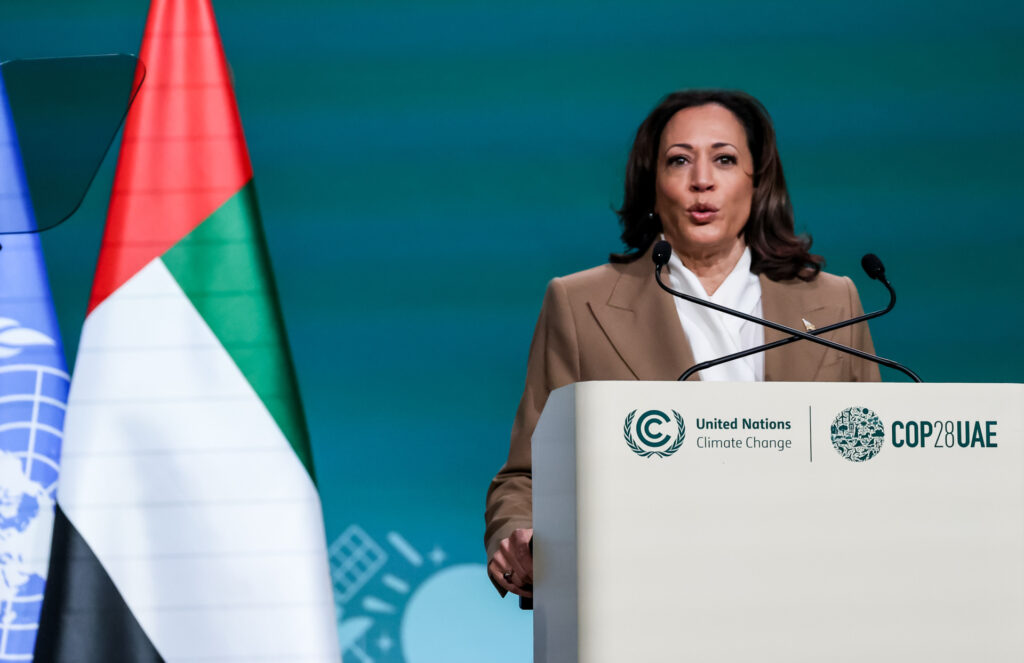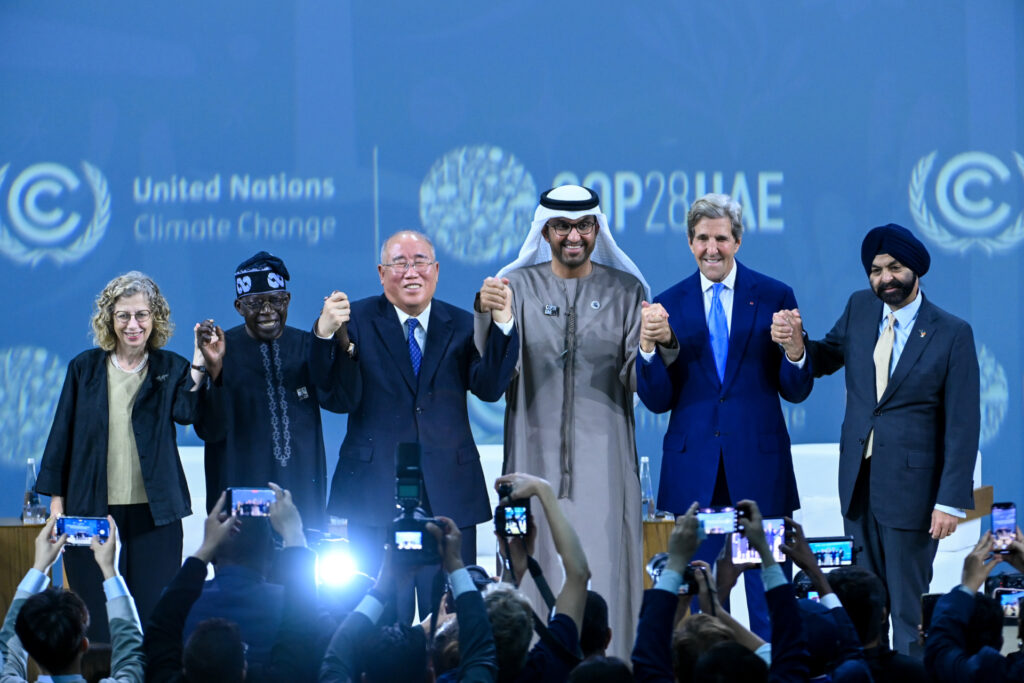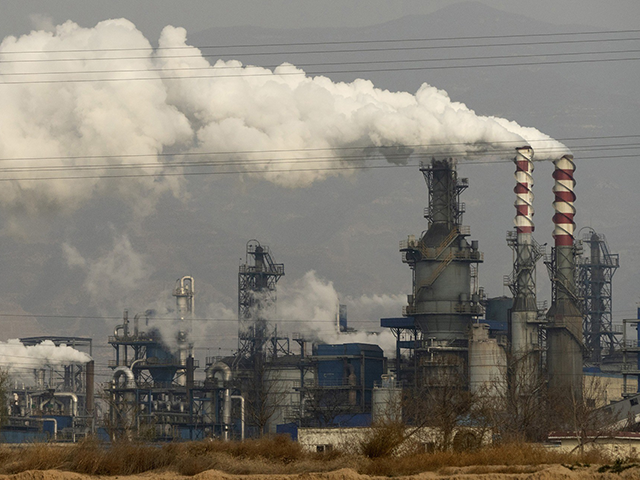The United Nations’ annual climate alarmism conference, COP28, concluded Sunday with minimal chatter on carbon emissions — for decades, the primary target of environmental activists — and a slew of new commitments to reduce methane emissions.
Methane is a more potent pollutant than carbon dioxide but has long failed to take the spotlight away from the most internationally recognizable greenhouse gas. The text of the Paris Agreement, for example — signed at COP21 in 2015 — does not mention methane, instead focusing on committing the 172 countries that originally signed it to carbon neutrality in the near future.
Yet, somewhat abruptly, the focus of the commitments coming out of COP28 on Saturday was on methane, delighting environmental experts who consider it a “super-pollutant” and governments like those of communist China, which is on a fast track to failing to meet any of its Paris Agreement promises. COP28 had already attracted significant condemnation from “green” activists in response to the United Nations granting hosting duties to the United Arab Emirates (UAE), a major global oil power, and, specifically, handing the presidency of the summit to Sultan Ahmed Al Jaber, the CEO of the state-run Abu Dhabi National Oil Company (ADNOC).

COP28 President Sultan Ahmed Al Jaber prepares for a plenary session with COP28 CEO Adnan Amin at the COP28 U.N. Climate Summit on December 1, 2023, in Dubai, United Arab Emirates. (AP Photo/Peter Dejong)
Methane can be a byproduct of oil drilling, fracking, and coal mining, among other fossil fuel production. However, it is most associated with the natural gas industry, as storing and shipping gas can cause methane leaks.
Al Jaber announced on Saturday that representatives of 50 oil companies — including some of the world’s largest state oil companies, such as Saudi Arabia’s Aramco and Brazil’s Petrobras — had signed an agreement to “reach near-zero methane emissions and end routine flaring” by 2030, according to the Qatari outlet Al Jazeera. The deal also allegedly included a promise to reduce carbon emissions to “net zero” by 2050 — “net” meaning that the companies offset any of their emissions with investments in environmental efforts. Among the signatories, 29 are government oil companies. Notably absent among them, however, were China’s largest oil companies.
On the same day, the administration of American President Joe Biden debuted a new set of regulations intended to reduce the amount of methane entering the atmosphere. According to the Environmental Protection Agency (EPA), these rules will require oil and gas companies to “phase in a requirement to eliminate routine flaring of natural gas that is produced by new oil wells” and “require comprehensive monitoring for leaks of methane from well sites and compressor stations.”

Vice President of the United States of America Kamala Harris addresses national delegations during COP28 in the Dubai Exhibition Center, United Arab Emirates, on December 2, 2023. (Dominika Zarzycka/NurPhoto via Getty Images)
The new EPA standards also:
[Create a] Super Emitter Program that will utilize third-party expertise in remote sensing to detect large methane releases or leaks known as “super emitters” which recent studies have indicated account for almost half of methane emissions from the oil and gas sector.
China, the world’s worst polluter, used COP28 to demand “international cooperation to enhance methane control” and tout a vague proposal it debuted in late November to curb its own emissions. However, Chinese climate envoy Xie Zhenhua insisted on keeping expectations low that China will actually achieve any reductions, noting that the Communist Party is not even tracking its methane emissions with efficiency.
“China’s work on methane emissions control started late and has a weak foundation,” Xie conceded at COP28, according to China’s state-run Global Times newspaper.
“The data is unclear, and there are insufficient statistical accounting and monitoring capabilities, an imperfect regulatory, standard, and policy system, and an urgent need for improvement in technical and management capacities,” Xie added.
“I believe that many developing countries are in the same situation as us. We are willing to act, but our capabilities are lacking, and we need to continue to work hard and strengthen this area through international cooperation,” Xie insisted.

COP28 President Sultan Al Jaber (C), U.S. Special Presidential Envoy for Climate John Kerry (R2), Chinese Politician Xie Zhenhua (L3), President of the World Bank Ajay Banga (R1), and UNEP Executive Director Inger Andersen (L1) during COP28 on December 2, 2023, in Dubai, United Arab Emirates. (Stuart Wilson / COP28 via Getty Images)
China claims to remain a “developing country” despite being the second-largest economy in the world.
The interest in methane follows a year in which experts began expressing pessimism about governments achieving the goals they signed onto in the Paris Agreement, which were customized by country, meaning wealthier countries committed to more significant emissions reductions than smaller or poorer countries. Some countries, such as China, committed to increasing carbon emissions; in China’s case, Beijing promised to “peak” at emissions in 2030. In November, the U.N. Environment Program (UNEP) and Stockholm Environment Institute published a joint report warning that 17 of 20 signatories to the Paris Agreement chosen for the study had not moved quickly enough to eliminate coal burning or fossil fuels generally for it to be possible for them to keep their promises. Governments worldwide were on the way to exceeding the limits of their climate promises by more than 110 percent by 2030, the study claimed.
A month prior to that report, the Climate Vulnerable Forum (CVF) estimated that only four of the major economies in the Paris Agreement were on track to meet their 2030 targets. One of them was India, which made relatively modest commitments.
Others making more strenuous commitments have already begun to show signs of concern that reaching the goals may be impossible. In November, officials from South Africa told Reuters that shutting down all of its coal power plants by 2034, as the Paris Agreement would require, is currently impossible without effectively leaving the country without electricity. South Africa already suffers through routine blackouts, known as “load-shedding,” under its longstanding socialist government.

COMMENTS
Please let us know if you're having issues with commenting.